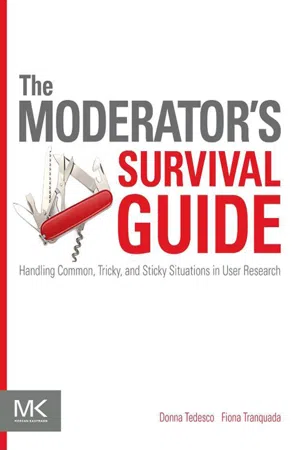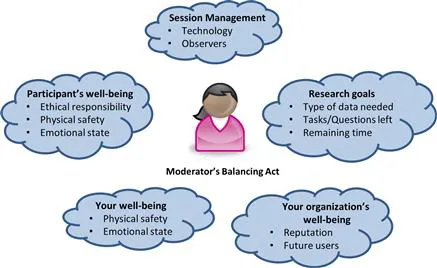
eBook - ePub
The Moderator's Survival Guide
Handling Common, Tricky, and Sticky Situations in User Research
Donna Tedesco,Fiona Tranquada
This is a test
Partager le livre
- 364 pages
- English
- ePUB (adapté aux mobiles)
- Uniquement disponible sur le Web
eBook - ePub
The Moderator's Survival Guide
Handling Common, Tricky, and Sticky Situations in User Research
Donna Tedesco,Fiona Tranquada
Détails du livre
Aperçu du livre
Table des matières
Citations
À propos de ce livre
The Moderator's Survival Guide is your indispensable resource for navigating the rocky shoals of your one-on-one user research sessions. Inside, you'll find guidance for nearly 100 diverse situations (ranging from business-as-usual to tricky and sticky) that might occur during usability studies, contextual inquiries, or user interviews.
As a moderator, you are responsible for the well-being of the participant, your study, and your organization. You must be prepared for anything that may happen, from your technology failing to the participant quailing. Use this guide to identify your best next steps, react appropriately, and survive any challenges that comes your way.
- Practical, field-tested, and actionable tips for what to do and say—and what NOT to do or say—in each situation.
- Key patterns and extensive examples to sharpen your approach to the commonplace and prepare you for the unlikely.
- Illustrative "survival stories" contributed by numerous professionals on the front lines of user research.
Foire aux questions
Comment puis-je résilier mon abonnement ?
Il vous suffit de vous rendre dans la section compte dans paramètres et de cliquer sur « Résilier l’abonnement ». C’est aussi simple que cela ! Une fois que vous aurez résilié votre abonnement, il restera actif pour le reste de la période pour laquelle vous avez payé. Découvrez-en plus ici.
Puis-je / comment puis-je télécharger des livres ?
Pour le moment, tous nos livres en format ePub adaptés aux mobiles peuvent être téléchargés via l’application. La plupart de nos PDF sont également disponibles en téléchargement et les autres seront téléchargeables très prochainement. Découvrez-en plus ici.
Quelle est la différence entre les formules tarifaires ?
Les deux abonnements vous donnent un accès complet à la bibliothèque et à toutes les fonctionnalités de Perlego. Les seules différences sont les tarifs ainsi que la période d’abonnement : avec l’abonnement annuel, vous économiserez environ 30 % par rapport à 12 mois d’abonnement mensuel.
Qu’est-ce que Perlego ?
Nous sommes un service d’abonnement à des ouvrages universitaires en ligne, où vous pouvez accéder à toute une bibliothèque pour un prix inférieur à celui d’un seul livre par mois. Avec plus d’un million de livres sur plus de 1 000 sujets, nous avons ce qu’il vous faut ! Découvrez-en plus ici.
Prenez-vous en charge la synthèse vocale ?
Recherchez le symbole Écouter sur votre prochain livre pour voir si vous pouvez l’écouter. L’outil Écouter lit le texte à haute voix pour vous, en surlignant le passage qui est en cours de lecture. Vous pouvez le mettre sur pause, l’accélérer ou le ralentir. Découvrez-en plus ici.
Est-ce que The Moderator's Survival Guide est un PDF/ePUB en ligne ?
Oui, vous pouvez accéder à The Moderator's Survival Guide par Donna Tedesco,Fiona Tranquada en format PDF et/ou ePUB ainsi qu’à d’autres livres populaires dans Diseño et Diseño UI/UX. Nous disposons de plus d’un million d’ouvrages à découvrir dans notre catalogue.
Informations
Sujet
DiseñoSous-sujet
Diseño UI/UXPart 1
Your Moderation Toolkit
Outline
Chapter 1 Moderation Matters
Chapter 2 In the Trenches
Chapter 3 Mix and Match
Chapter 1
Moderation Matters
Power, Responsibility, and Style
Abstract
As the moderator of a user research session, you’re responsible for the competing needs of the participant’s emotional and physical state, your own emotional and physical state, your study’s research goals, overall management of the session, and the protection of your organization. Balancing all these needs requires empathy, flexibility, creativity, a sense of humor, and an aura of authority. These qualities combine with your moderating style to ensure that you can make your session as successful as possible, and that you can adapt as needed to any changing conditions.
Keywords
user research moderating style; new usability moderators; user research empathy; user research flexibility; user research creativity; user research sense of humor
1.1 “Are they laughing at me?”
1.2 Power and responsibility
1.3 The session ringmaster
1.4 The science and art spectrum
1.5 Your moderating style
1.6 Effective adaptation
1.1 “Are they laughing at me?”
I used to work at an institution of higher learning. We did a lot of usability testing, up to 120 studies a year. One particular day we had a client who wanted to test a website, but wanted their entire department staff to observe the testing. Our observation room sat 12 and it was mostly filled. Being late in the day, the observers were getting slaphappy after watching users identify the same usability problems over and over again. It was our last session of the day when we encountered a slightly more eccentric participant than normal.
As she was tackling the tasks, she was quite entertaining in some of her feedback, and you could hear, through the adjoining wall to the observation room, muffled commentary becoming louder. I proceeded to instant message my colleague in the room to have the observers keep it down, but by the time she read my note, it was too late. My participant’s eccentric nature had come out via an absolutely hysterical comment that I, as the moderator, had to literally bite my tongue to not laugh at. While I controlled my own reaction, a volcanic eruption of laughter could be heard through the wall. As my participant heard them, her face changed immediately, followed with “Are they laughing at me?”
I no longer wanted to laugh. I was paralyzed with “What do I do?” I lied. I told her no, they’re not laughing at her, but rather that everyone who has come in here today has had a similar experience with this task, so we’ll have to redesign the website. It was the best I could do at the time, but I’m not sure she believed me. During the next several tasks, there were no sounds from the observation room; they were as silent as she had become. At the end, I walked her out and apologized on behalf of the observers.
—Michael Dutton
1.2 Power and responsibility
Michael’s story emphasizes how important a role you have as the moderator of a user research session. Your position on the session’s frontlines means that when tricky, sticky, and unexpected situations arise, you’re the one who has to decide what to do and then take action.
When you encounter an awkward or uncomfortable situation with a friend or someone else you know, you can inform your response with your knowledge about that person. You rarely have any additional knowledge to help you when the same situation happens during a user research session. And, of course, you have additional complications to consider. During a session, your reactions as a moderator must balance the following competing needs (Figure 1.1):





Throughout a session, this balance may shift and you, as the moderator, have to adjust accordingly. The way you handle a situation at the beginning of a session may be very different than how you’d handle the same situation later on, even with the same participant.

Figure 1.1 As the moderator, you’re balancing a lot of competing needs during the session.
Take the example of the usability study session from Michael’s story. At the beginning of the session, his duty as the moderator was mainly to elicit feedback that satisfied the study’s goals. Some minimal encouragement may have been needed along the way to keep the participant content, but his larger concerns were to stay neutral and keep the observers engaged in the session. But as soon as the participant heard laughter from the adjacent room, she became uncomfortable, embarrassed, and all too aware that her performance was being watched.
At this point, the balance of competing needs shifted away from the session goals and more toward the participant’s emotional comfort. Because the participant’s comfort was at risk, Michael’s attention as a moderator had to focus less on collecting feedback and more on making sure that she was okay and would leave the session feeling comfortable (rather than upset at him or his organization). Under normal conditions, telling the participant that everyone else had the same experience with the task might have been considered biasing. But Michael sacrificed that data integrity to help the participant relax and to avoid tarnishing the reputation of his organization. Also, he needed to ease tension between himself and the participant for his own emotional comfort.